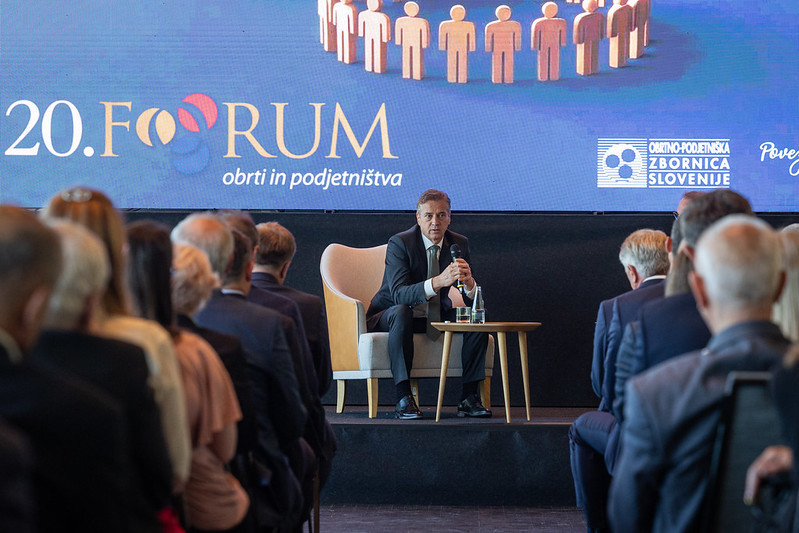Prime Minister Golob: "I am pleased that the economic and social dialogue has been running smoothly and delivering results"
In the discussion, Prime Minister Golob and Director‑General Lamperger highlighted a number of important topics, in particular social dialogue. The Prime Minister began by emphasising the importance of a powerful social dialogue, and the positive developments over the last year. "I am pleased that the economic and social dialogue has been running smoothly and delivering results. This is one of the key positive developments. We look forward to our joint successes, because together we can achieve so much more. It is clear, however, that the interests of the government and employers sometimes diverge," the Prime Minister said. Speaking of the achievements, he mentioned progress in the area of debureaucratisation, such as the recording of working time. It should be noted that following the implementation of the salary reform, the first general meeting between the representatives of the Government and public sector trade unions was held on 9 April at which the President of the Confederation of Public Sector Trade Unions, Branimir Štrukelj, said that the ongoing social dialogue could be an example of good practice.
The Prime Minister went on to highlight the positive results of the Eurobarometer survey, showing that 94% of Slovenians are satisfied with their lives. "When I am asked why, the answer is simple: because we know how to function as a community," the Prime Minister explained. According to him, living in Slovenia has distinct advantages, including public education and healthcare, and security, which are indispensable for a decent life. "This makes it all the more important that we further strengthen an efficient public sector," he added.
One of the main topics of the discussion was the Long-Term Care Act. The Prime Minister explained that the law is aimed at ensuring a dignified old age. "Funds will be provided for services for the elderly – services that must be accessible and rationally designed. This is the very foundation of a solidarity based society," he said.
The Prime Minister also mentioned the challenges to Europe's competitiveness and the importance of a stable Slovenian economy. "Slovenia's economy is strong, which helps it tackle many challenges, and we should be proud of that. We will establish a special expert group to support small businesses, which are of great importance for the Slovenian economy," he announced.
The Prime Minister also spoke about the defence industry's potential. "The defence industry will be a great business opportunity. The trend is not just to increase manufacturing or buy more weapons, but to increase defence spending and to localise it in Europe. One of the responses to Draghi's report is to strengthen the defence industry. Slovenian start-ups have already achieved excellent results, but I would like to see more. Areas such as digitalisation, cyber security, food security, medicine and space technology will play an important role," he said.
The Prime Minister touched on the topic of foreign workers. At the last year's Craft and Entrepreneurship Forum, he said that the Government had already taken some measures in this area and the trend then was good, with 20% more work permits issued in April 2024 compared to April 2023. In today's discussion, he highlighted the important changes the Government introduced in the area of employment of foreigners. "The most important change in the recruitment of labour is that with the measures we have taken, a worker will be able to start work immediately," he said.
The Prime Minister also responded to the current draft of the network charge act. "The act on network charges is an embarrassment for the profession and the energy sector. I hope that the new Energy Agency Council will prepare new guidelines and a new network charge act by summer. If this does not happen, we will consider amending the legislation. There is no benefit from the current regulation, we all feel the damage that it has caused," he concluded.


